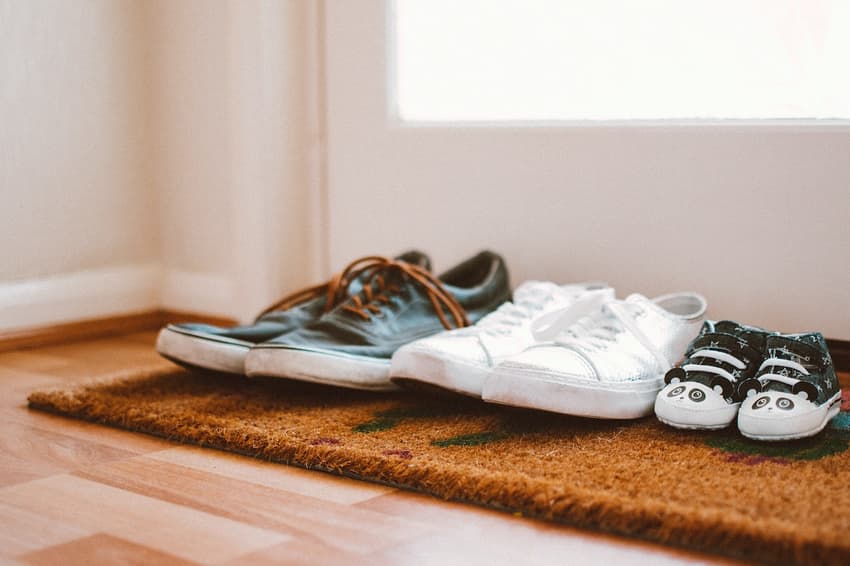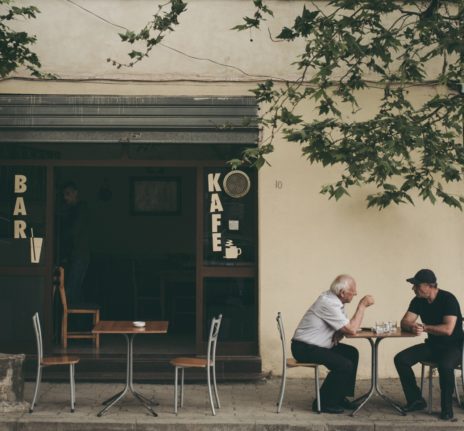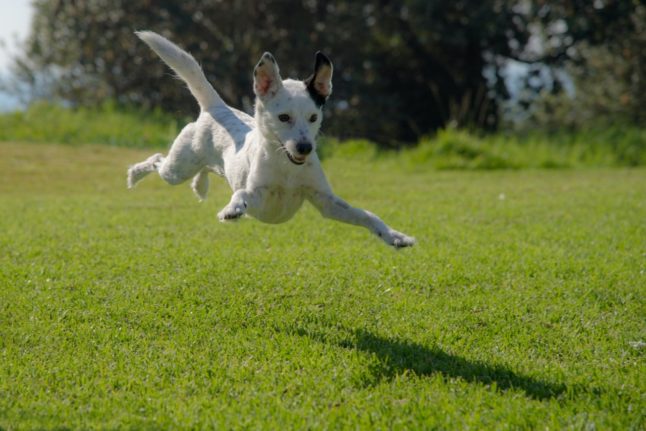12 ways to cause offence in Austria as a foreigner (and how to avoid it)

Every country has its own set of “rules” and social norms, and it can be easy to get it wrong as an international resident. Here’s what not to do in Austria if you don’t want to offend the locals.
Living in Austria has many benefits – fresh air, beautiful scenery, a vibrant cultural scene and a high standard of living.
But it’s not always easy to integrate in society as an international resident, especially in places like Vienna that was named as the world’s “unfriendliest city” in the Expat City Ranking 2022.
FOR MEMBERS: Falco to Schwarzenegger: Six Austrian cultural icons that you need to know
So what’s a foreigner in Austria to do?
We asked readers of The Local to tell us more about these “rules” and, more importantly, how to avoid breaking them and offending Austrians.
Talk too loudly
Several readers told us they had been told off for talking too loudly in public, so keep this mind when meeting up with friends.
One respondent, who asked to remain anonymous, said: “A man came up to me on a tram and yelled in my face that I was talking too loudly. I apologised and explained I wasn't aware that was a thing over here. He said something in German that sounded mean and walked off.”
Similarly, Shuporna in Graz said: “A lady shouted at me that I was too loud. Unfortunately my German speaking skills were not good. I could understand but not answer in German. So I said that she should visit a church or meditation centre to find silent places. A cafe is a public place where people are generally chatting.”
You have been warned.
READ ALSO: Ten weird Austrian laws foreigners need to know about
Use “du” in a “Sie” situation
Anyone who has spent time learning German will know the difference between “du” and “Sie”. But for everyone else, here’s a quick explainer.
“Du” is the informal way to say “you” in German. It’s used in casual settings, like when meeting friends in a cafe or when speaking with a neighbour you know very well.
“Sie”, on the other hand, is the formal “you”. This is used in more professional situations or when you need to show respect for someone, such as a doctor, a police officer or an older person that you don’t know.
Non-native speakers of German are often granted some leeway with this rule – especially if their native language doesn't have the formal and informal versions of "you", like in English.
But there are still situations where if you use “du” instead of “Sie”, you might cause offence. So if you meet with a local government official or are pulled over by a police officer, be polite and switch to “Sie”.

An alarm clock lies in the leaves. Photo: picture alliance / dpa | Sebastian Kahnert
Lateness
Austrians are well known for being on time and don’t like to be late. As a result, they don’t appreciate lateness in other people either.
When asked how to cause offence in Austria, Toni in Tirol told The Local: “Being late! Austrians are very punctual.”
This applies to all situation, whether going to work or meeting a friend for coffee. Don’t be late and earn yourself some brownie points in the process.
READ NEXT: Nine mistakes everyone makes when they first move to Austria
Not removing shoes at the front door
Most Austrian households don’t allow outdoor shoes in the main home, which means you need to remove your shoes by the door when visiting someone’s house. And if you don’t, you will cause offence.
In fact, this is so instilled in the culture that some people have a supply of house shoes (Hausschuhe) so that guests don’t get cold feet when they visit.
Ridicule Austrian traditions
Cara Saunders in Tirol said foreigners can cause offence by “belittling or poking fun at traditions, such as food, clothing, skiing and alms.”
This is important to remember because Austrians are proud of their traditions, especially in the Alps where traditional mountain ways are still a big part of life today.
However, at the same time, Cara said: “In general, I don’t think that Austrians get easily offended. Generally, it is best to be honest, loyal and genuine in your dealings with Austrians.”
Ask to pay by card
Cash is still king in Austria. This is so instilled in the culture that there is even the saying, “Nur Bares ist Wahres” (only cash is true).
And even though card and digital payments have become more widespread since the acute pandemic years, there are still some places that will only accept cash. Then there are other places where the staff will act like you have just insulted their mother if you ask to pay by card.
So if going out for a drink in a traditional bar or visiting a mountain hut, always take some cash. Just in case.
READ MORE: Discover Austria: How to make the most of 24 hours in Innsbruck

Photo by Juri Gianfrancesco on Unsplash
Assume everyone speaks English
English is the most spoken second language in Austria, but that doesn’t mean everyone can speak English, or even wants to.
Sean in Linz told The Local that Austrians are offended if you “immediately ask if they speak English.”
When asked for further details, he said: “I enquired about a parking ticket at the police and was told, ‘Sorry, here we only speak German as we are in Austria’”.
Our top advice is to at least learn the basics in German when living in Austria, and try to pick up a few dialect words, too.
Mention the war
For many British people, the phrase “Don’t mention the war” will bring back memories of a famous Fawlty Towers episode* with German characters. But it can just as easily apply to Austria.
Karen Pradhan in Salzburg said: “I believe Austrians are offended by immigrants telling Hitler or Nazi jokes, or jokes that they lost World War II.”
Basically, to avoid any awkward exchanges with the locals, don’t mention the war.
Or, as Karen put it: “Just be respectful. It’s a small world and we all have to live in it together.”
*For those that don’t know, the episode involves hotel owner Basil Fawlty trying not to mention World War II or Hitler when serving German guests. He fails, spectacularly.
Criticise (even if an Austrian does it first)
Gafe in Vienna said “being wrong is not something people accept easily here”, although Austrians are often happy to criticise others.
This means even though an Austrian might criticise you first, expect them to be offended if you do the same.
When asked how to avoid causing offence, Gafe said: “I think it is difficult to avoid causing offence because there is a very "black or white" attitude here and never "grey". But I guess that having a conversation in German could be a good way to try to deescalate a situation.”
FOR MEMBERS: Austrian folklore: Myths and legends you should know about
Buy sandwich/toast bread
In places like the UK and US, many people buy pre-sliced sandwich bread (known as Toastbrot in Austria) for their everyday groceries. But this rarely happens in the Alpine Republic.
In Austria, good quality bread is an important part of the diet and most people buy bread from a bakery, instead of a supermarket. Or at the very least, at an in-store bakery in a supermarket.
So if you try to serve regular sandwich bread to an Austrian, then there’s a high chance you will cause offence.

Let a dog run around too fast
Austria is a very pet friendly country, but there is an expectation that pets will be well-behaved. In fact, Gafe in Vienna told The Local that he caused offence by letting a dog run around too fast in a dog park.
The solution? Take advantage of canine expertise courses like Hunde-Sachkunde, which is mandatory for all new dog owners in Austria.
READ ALSO: EXPLAINED: Everything you need to know about owning a pet in Austria
Make small talk
For people from countries like the UK and Spain, small talk is a guaranteed conversation starter. But in Austria, it’s not as common and people generally prefer to have meaningful conversations about topics they are interested in.
Austrians can also be more reserved around people they are not familiar with and shy away from asking personal questions until they know them better.
According to Jim in Vienna, if you want to avoid offending the locals, “don’t talk so loud and stop being overly friendly.”
Comments
See Also
Living in Austria has many benefits – fresh air, beautiful scenery, a vibrant cultural scene and a high standard of living.
But it’s not always easy to integrate in society as an international resident, especially in places like Vienna that was named as the world’s “unfriendliest city” in the Expat City Ranking 2022.
FOR MEMBERS: Falco to Schwarzenegger: Six Austrian cultural icons that you need to know
So what’s a foreigner in Austria to do?
We asked readers of The Local to tell us more about these “rules” and, more importantly, how to avoid breaking them and offending Austrians.
Talk too loudly
Several readers told us they had been told off for talking too loudly in public, so keep this mind when meeting up with friends.
One respondent, who asked to remain anonymous, said: “A man came up to me on a tram and yelled in my face that I was talking too loudly. I apologised and explained I wasn't aware that was a thing over here. He said something in German that sounded mean and walked off.”
Similarly, Shuporna in Graz said: “A lady shouted at me that I was too loud. Unfortunately my German speaking skills were not good. I could understand but not answer in German. So I said that she should visit a church or meditation centre to find silent places. A cafe is a public place where people are generally chatting.”
You have been warned.
READ ALSO: Ten weird Austrian laws foreigners need to know about
Use “du” in a “Sie” situation
Anyone who has spent time learning German will know the difference between “du” and “Sie”. But for everyone else, here’s a quick explainer.
“Du” is the informal way to say “you” in German. It’s used in casual settings, like when meeting friends in a cafe or when speaking with a neighbour you know very well.
“Sie”, on the other hand, is the formal “you”. This is used in more professional situations or when you need to show respect for someone, such as a doctor, a police officer or an older person that you don’t know.
Non-native speakers of German are often granted some leeway with this rule – especially if their native language doesn't have the formal and informal versions of "you", like in English.
But there are still situations where if you use “du” instead of “Sie”, you might cause offence. So if you meet with a local government official or are pulled over by a police officer, be polite and switch to “Sie”.

Lateness
Austrians are well known for being on time and don’t like to be late. As a result, they don’t appreciate lateness in other people either.
When asked how to cause offence in Austria, Toni in Tirol told The Local: “Being late! Austrians are very punctual.”
This applies to all situation, whether going to work or meeting a friend for coffee. Don’t be late and earn yourself some brownie points in the process.
READ NEXT: Nine mistakes everyone makes when they first move to Austria
Not removing shoes at the front door
Most Austrian households don’t allow outdoor shoes in the main home, which means you need to remove your shoes by the door when visiting someone’s house. And if you don’t, you will cause offence.
In fact, this is so instilled in the culture that some people have a supply of house shoes (Hausschuhe) so that guests don’t get cold feet when they visit.
Ridicule Austrian traditions
Cara Saunders in Tirol said foreigners can cause offence by “belittling or poking fun at traditions, such as food, clothing, skiing and alms.”
This is important to remember because Austrians are proud of their traditions, especially in the Alps where traditional mountain ways are still a big part of life today.
However, at the same time, Cara said: “In general, I don’t think that Austrians get easily offended. Generally, it is best to be honest, loyal and genuine in your dealings with Austrians.”
Ask to pay by card
Cash is still king in Austria. This is so instilled in the culture that there is even the saying, “Nur Bares ist Wahres” (only cash is true).
And even though card and digital payments have become more widespread since the acute pandemic years, there are still some places that will only accept cash. Then there are other places where the staff will act like you have just insulted their mother if you ask to pay by card.
So if going out for a drink in a traditional bar or visiting a mountain hut, always take some cash. Just in case.
READ MORE: Discover Austria: How to make the most of 24 hours in Innsbruck

Assume everyone speaks English
English is the most spoken second language in Austria, but that doesn’t mean everyone can speak English, or even wants to.
Sean in Linz told The Local that Austrians are offended if you “immediately ask if they speak English.”
When asked for further details, he said: “I enquired about a parking ticket at the police and was told, ‘Sorry, here we only speak German as we are in Austria’”.
Our top advice is to at least learn the basics in German when living in Austria, and try to pick up a few dialect words, too.
Mention the war
For many British people, the phrase “Don’t mention the war” will bring back memories of a famous Fawlty Towers episode* with German characters. But it can just as easily apply to Austria.
Karen Pradhan in Salzburg said: “I believe Austrians are offended by immigrants telling Hitler or Nazi jokes, or jokes that they lost World War II.”
Basically, to avoid any awkward exchanges with the locals, don’t mention the war.
Or, as Karen put it: “Just be respectful. It’s a small world and we all have to live in it together.”
*For those that don’t know, the episode involves hotel owner Basil Fawlty trying not to mention World War II or Hitler when serving German guests. He fails, spectacularly.
Criticise (even if an Austrian does it first)
Gafe in Vienna said “being wrong is not something people accept easily here”, although Austrians are often happy to criticise others.
This means even though an Austrian might criticise you first, expect them to be offended if you do the same.
When asked how to avoid causing offence, Gafe said: “I think it is difficult to avoid causing offence because there is a very "black or white" attitude here and never "grey". But I guess that having a conversation in German could be a good way to try to deescalate a situation.”
FOR MEMBERS: Austrian folklore: Myths and legends you should know about
Buy sandwich/toast bread
In places like the UK and US, many people buy pre-sliced sandwich bread (known as Toastbrot in Austria) for their everyday groceries. But this rarely happens in the Alpine Republic.
In Austria, good quality bread is an important part of the diet and most people buy bread from a bakery, instead of a supermarket. Or at the very least, at an in-store bakery in a supermarket.
So if you try to serve regular sandwich bread to an Austrian, then there’s a high chance you will cause offence.

Let a dog run around too fast
Austria is a very pet friendly country, but there is an expectation that pets will be well-behaved. In fact, Gafe in Vienna told The Local that he caused offence by letting a dog run around too fast in a dog park.
The solution? Take advantage of canine expertise courses like Hunde-Sachkunde, which is mandatory for all new dog owners in Austria.
READ ALSO: EXPLAINED: Everything you need to know about owning a pet in Austria
Make small talk
For people from countries like the UK and Spain, small talk is a guaranteed conversation starter. But in Austria, it’s not as common and people generally prefer to have meaningful conversations about topics they are interested in.
Austrians can also be more reserved around people they are not familiar with and shy away from asking personal questions until they know them better.
According to Jim in Vienna, if you want to avoid offending the locals, “don’t talk so loud and stop being overly friendly.”
Join the conversation in our comments section below. Share your own views and experience and if you have a question or suggestion for our journalists then email us at [email protected].
Please keep comments civil, constructive and on topic – and make sure to read our terms of use before getting involved.
Please log in here to leave a comment.